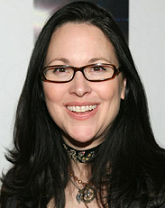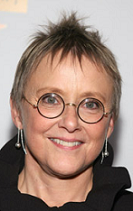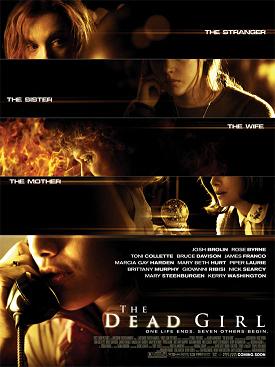
Main Page
Interviews Menu
Alphabetical Menu
Chronological Menu



Karen Moncrieff wrote and directed The Dead Girl about how different people react to the recent murder of Krista (Brittany Murphy) including her mother, Melora (Marcia Gay Harden), and Ruth (Mary Beth Hurt), a mother who discovers evidence that her son killed Krista. This is Karen Moncrieff's second feature film; she previously directed Blue Car. Mary Beth Hurt has acted in many films ranging from Lady in the Water, The Exorcism of Emily Rose, Red Dragon to Affliction, Age of the Innocence and Interiors.I had the privilege to interview both Karen Moncrieff and Mary Beth Hurt together. First Look Pictures will release The Dead Girl on December 29th, 2006 at the Angelika Film Center. NNYC MOVIE GURU: Why did you decide to make The Dead Girl? KM: Iím interested in movies that make people feel something and thatís what I gravitate toward. I like to be pushed off my center when I go to the movies. I like to be invited to feel and think and I hope that thatís what this movie does. At the end of it, you are left with the great sadness of the waste that was this one womanís life. Hopefully, youíre also left with some hope for the other characters who, when we find them, are dead in some ways. I think thereís a lot of hope and uplift in it [which is] balanced with a lot of sadness. MBH: Rather than feeling sad, it does seem to me to be dark. Even the cinematography is dark in many ways. But what I hope it does is make people think in a way that is originally to filmmaking. NYC MOVIE GURU: What makes The Dead Girl different from other movies in the same genre? KM: Politically, Iím not interested in showing another woman being murdered onscreen. Weíve seen it over and over and I donít really want to add to that. I was really interested in examining the lives of some women who we havenít seen before. Weíve certainly seen serial killers dealt with in films, but I donít know if weíve ever seen the wife of a serial killer. We struggled a lot to make sure that we werenít condescending to [Ruth] and that the fullness of her life and her experiences got on the screen. That scene, to me, is my favorite scene in the movieóthe way you serve them the tea. NYC MOVIE GURU: Did you have any of the actors in mind while writing the script? KM: Yes, I always keep a little wish list of who I want to work with and whoís perfect for the parts and I had watched, pretty much, everything I could get my hands on for Mary Beth [Hurt]. Actually, the financiers had hired her before and felt they knew who she was and felt she was too strong for this part. I had scene all the colors, [so-to-speak], that I was looking for in Mary Beth [Hurt]ís work and I knew, also, that she was just a consummate, well-trained actress. I knew that she would just knock it out of the park. NYC MOVIE GURU: What technique do you use when you direct actors? KM: What I actually try to do is to find out if the actor is willing to tell me beforehand what the process is, [what] their training is and how they like to work and be supported by a director and I try to adapt myself. For instance, Brittany [Murphy] really likes to be given adjustments in the middle of a take which most actors would hate. For her, it creates some sort of kinetic energy that she can feed off of, especially for a part like this. Then there are other actors for whom I try to lay back and I donít say much of anythingójust small adjustments. NYC MOVIE GURU: Did you include any rehearsal time? KM: A very short rehearsaló2 days, 1 with Giovanni [Ribisi] and Toni [Colette] and 1 with Piper [Laurie] and Toni [Colette], but then we were on to all of these other actors who were doing other projects. Marcia [Gay Harden] and Mary Beth [Hurt] came in the middle of the schedule. The whole film was shot [in] 25 days. Those were very intense days. NYC MOVIE GURU: How did you approach the actors with the nude scenes, particularly the one with Toni Colette? KM: All the actors in the movie including Giovanni [Ribisi], Toni [Colette] and Mary Beth [Hurt and I] all discussed what the point of the nudity was and, in all cases, all the actors said that they felt that it wasnít gratuitous. I specifically remember talking to Mary Beth [Hurt]. I asked [her] how [she] felt about it given that it was in the script and I told [her] what I intended to do and [she] said, ďWell, I donít believe itís gratuitous; I think itís absolutely necessary and I understand why itís here and the point of it. Iíve never done it before. It scares the hell out of me, but Iím just going to take a valium and do itĒ. I love the bravery behind that and I do think that it is one of the most powerful moments in the movie. Itís not about seeing somebodyís physical being; itís about this woman trying to achieve some level of cleansing that would not have been achieved had she left her bra and underwear on. MBH: To me, it felt like she was taking her skin offóshe was become someone else. NYC MOVIE GURU: What drew you to the script? MBH: The first thing that drew me to the script was the quality of Karenís writingóitís so subtle and intricate. This was a character that Iíve never seen before, but I completely understand this woman. When she calls someone, she doesnít call a friend; she calls the brother of her husband. She doesnít call anyone from her family. At one point she says [that] her niece would be happy to have heróthat was blatantly not true. She has a trailer home in a storage facility and that is it. The choice between what she clearly knows is a moral choice and the continuation of her life, literally, is the choice that she has to make at this point. I completely understand the choice that she made. NYC MOVIE GURU: Did you discuss the script with Mary Beth Hurt? KM: [Yes], Mary Beth [Hurt] and I had a long discussion about the script on the phone before we got together and then I feel like, in finding the character and finding the moment, we were sort of engaged in a really strong, effective struggle to find the moments. MBH: It wasnít entirely comfortable, but I donít think that thatís a bad thing necessarily. If nobodyís quitting, then it can really be very effective. More things come out of both people. NYC MOVIE GURU: Do you consider Ruth to be a likable character? KM: I think that she really is likable, but what a lot of people would call her is unsympathetic because of [her actions]. To me, sheís entirely sympathetic throughout the whole thing. She makes a choice that Iím not condoning, but I empathize with her character throughout Mary Beth [Hurt] fulfilled her so completely. NYC MOVIE GURU: What do you think about the choice Ruth had to make? KM: I think itís a really terrible choice, a really human choice. In creating the character, I, kind of, worked backward from a detail that I read about a woman who made a similar choice and dumped evidence in a landfill from her husband who was a serial killer. In writing this, I thought to myself, ďWho is this person? Who must you be that that choice seems like a viable one?Ē To most of us, itís probably horrifying. Her life and how itís constructed requires that she makes that choice. In a certain way, she doesnít have lots and lots of options. Also, thereís something about the relationship with her husband. This film deals with familial ties, but I think that they are married, but thereís also a, sort of, mothering and protective instinct that work. As much as they might argue and fight and have these cycles that they go through, she loves him and he loves her in his way and they have created this relationship thatís odd as it is. She is [simply] protecting her man. MBH: Also, I thought that choice was interesting to me because I didnít know what it was like to be a wife until I was a wife. I never knew what it was like to be a mother until I was a mother. I donít think that any of us know what our choice would be. We know what it should be, but not what the choice would be when youíre finally at that point when you have to make a decision. What I wanted to do was not make that decision until the end of the vignette. NYC MOVIE GURU: How scripted was the profanity? KM: It was all scripted. There was one part at the end when the F-words came out even more in the scene with Josh Brolin in the car. There were a few more embellishments in there, but mostly itís as scripted. NYC MOVIE GURU: How did the MPAA react? KM: They flagged it for language and it received a solid R with the language and the nudity and other things. NYC MOVIE GURU: Before editing, did you have more scenes with Krista before she got killed? KM: No, as scripted, it stops just short of the moment she gets killed, but as I started editing, it seemed to me a lot more poignant because we know whatís going to happen to her if, instead of going to that moment, youíre left with her talking about her hopes for the future and that was more powerful to me. As often happens, in the editing room, you discover things that you werenít smart enough to think of when you were writing the script. MBH: The community that forms begins after she is killed, so the connection between the 5 vignettes of people doesnít begin until after she is killed. NYC MOVIE GURU: Describe a particular scene that didnít make it to the final cut. KM: After the end of Mary Bethís vignette, there was another little section which is no longer in there. To me, itís still not over. Even when itís over, itís still not over. She will continue to struggle with this decision into the future and I think that itís entirely possible that, as time goes on, she might [overcome it]. MBH: What was interesting to me was getting to that moment. NYC MOVIE GURU: What are you like inside the editing room? KM: Iím a very hands-on director in the editing room. Iím very picky about performance moments and I know, having been on the set, what the moments are that I want to use to build the performance. In the editing, there are always lots and lots of choices to make. I always go for those moments when Iím surprised and moved and trust my gut a lot. First, we assembled the thing whole a scripted with what I felt were the best moments. Then, over time, I screened it for people and re-cut so that what I intend to communicate actually gets communicated. Then, of course, there are other people who chime in, who have a right to chime in the length of things and what needs to be shorter. So, certain things [fell] by the waste-side, things that I liked a lot. In the course of things, there was one big shift that occurred: Mary Bethís section used to be the penultimate section and now it is in 3rd position. I always kept the first section first and the last section last, but I changed the order of the middle 3 and I found that, unlike what was happening in the script when I put Mary Bethís section in the middle, it suddenly created this engine of tension and this really interesting mystery engine that helped to propel the rest of the film and it broke up 2 sections that were, perhaps, a little too similar. So, that seemed to work really well and I just stuck with that. Main Page Interviews Menu Alphabetical Menu Chronological Menu ______________________________________________________ |
The NYC Movie Guru
themovieguru101@yahoo.com
Privacy Policy